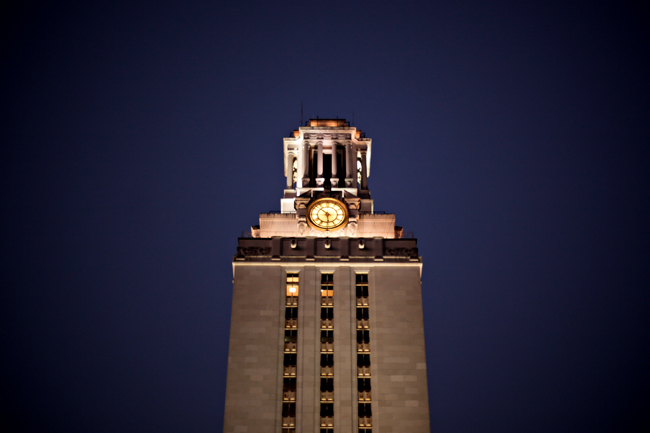When the Chronicle for Higher Education released its allegations of academic misconduct in the University’s athletics department this week, a collective groan was issued across the 40 Acres.
Legal, athletic and administrative officials groaned at the news that can only hamper the University’s reputation. Sports fans groaned, thinking of NCAA sanctions the Longhorns will receive if investigations confirm the reports. Even those uninterested in sports groaned upon hearing reports of yet another athlete screwing up, another flaw in the student-athlete system.
But what was the most unclear? Determining what parties are at fault should the allegations of improper assistance to ensure eligibility be true.
Details are still murky with the investigation into cheating allegations leveled at UT athletes. The University has not yet responded to an open records requests from the Texan for emails exchanged between involved parties. Nearly all of the involved parties are no longer affiliated with the University. (Rick Barnes “mutually parted ways” with the University in March to coach at Tennessee; P.J. Tucker now plays in the NBA; and Martez Walker withdrew from the University in the fall after allegations that he assaulted his girlfriend.) The University released a statement June 10 saying that it had no knowledge of the impropriety but will investigate.
But beyond the five cases that the University investigates, the reports point to a much larger problem.
The Texas case is far from isolated. In January, the NCAA was investigating 20 schools for academic misconduct — 18 of which competed in Division I athletics. In March, 20 university presidents and athletics officials met to begin revising academic legislation. The University of North Carolina at Chapel Hill was put on year-long probation June 11 by its accreditation agency following scandals including athletes enrolled in fake classes.
Across the board, the title “student-athlete” loses its prestige with the development of a stereotype that athletes use school as a springboard to professional leagues without concern for their educations.
Shereem Herndon-Brown, who has run an educational consulting company since his time as an admissions officer for Georgetown University, says the student-athlete demands are simply too high. With extensive practices, film studies and travel, student-athletes have little time left to invest in schoolwork.
“When they’re traveling and playing a lot, there are sometimes unfair demands on time for them to do it all,” Herndon-Brown said. “Pressure on academics comes from scarcity of time and academic unpreparedness.”
The latter source, academic unpreparedness, is a problem the NCAA has begun to tackle. Beginning in August, new NCAA legislation will require all athletes to maintain a 2.3 GPA in high school, to achieve baseline standardized test scores that complement their GPA and to complete 16 core courses in areas such as English, math and the sciences. Athletes who miss the bar cannot receive athletic scholarships or compete in the NCAA.
These requirements are important and helpful in ensuring athletes are capable of completing competitive university coursework. But we must go further. Parents and teachers as early as elementary and middle school must emphasize the necessity of academic competence for athletic success. Tutors and advisers must instill work ethics in their students even at young ages.
One Dallas-area tutor said that her athletic pupil entered high school extremly behind, claiming that athletics kept him in school through the years. Offering exceptions and too much extra help to athletes does not help them succeed; instead, it advances them to positions where they are likely to fail.
“We praise these kids so much for their athletic abilities … but I feel for the kid who comes in as a stud athlete and can’t thrive,” said Herndon-Brown, who counsels high school athletes on how to fulfill high school credits for eligibility and pick a university that properly fits their needs. “I wish we didn’t glorify high school athletes into thinking they don’t have to be prepared.”
The NCAA policies for academics are astonishingly fair, balancing the needs of students, a university and the association. They carefully avoid too much oversight into schools, serve to promote preparedness and issue consequences to institutions that break rules to enforce their measures.
Although the NCAA and the University each have their problems, the main cause of academic scandals such as these recent allegations is a culture of athlete glorification.
Schools and families of athletes must strive to change that mindset, for their students’ sakes but also for the sake of communities and fans. New men’s basketball coach Shaka Smart and his 2015–2016 roster performed no academic misconduct as far as we know. And yet, they — and all Longhorn fans — may face consequences in the coming months for others’ wrongdoing.
Make the athletes do their work and make them do the hard work when they’re young. It will save them a lot of hard work and struggle in the future. And it will also keep the rest of us from issuing another collective groan.





















